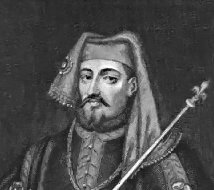 enry IV (1367-1413), king of England, son
of John of Gaunt, succeeded Richard II in 1399. Henry’s
accession to the throne came after he had secured the abdication
of Richard II. A rebellion broke out in Wales, but the Welsh were
defeated. In 1405 Scrope, Archbishop of York, rebelled, but was
easily overthrown; and in 1408, at Bramham Moor, the Percies were
subdued. Meanwhile Henry had given Parliament considerable powers,
and in 1407 the Commons gained the right of initiating money
grants. Secure in the support of the church and of Parliament,
Henry inaugurated a policy of opposition to the Lollards and an
era of premature constitutional government. He lived in dread
lest his son take his throne. See Wylie’s England under
Henry IV (1884-98), and Stubb’s Constitutional
History of England (1891). [World Wide Illustrated
Encyclopedia, 1935]
enry IV (1367-1413), king of England, son
of John of Gaunt, succeeded Richard II in 1399. Henry’s
accession to the throne came after he had secured the abdication
of Richard II. A rebellion broke out in Wales, but the Welsh were
defeated. In 1405 Scrope, Archbishop of York, rebelled, but was
easily overthrown; and in 1408, at Bramham Moor, the Percies were
subdued. Meanwhile Henry had given Parliament considerable powers,
and in 1407 the Commons gained the right of initiating money
grants. Secure in the support of the church and of Parliament,
Henry inaugurated a policy of opposition to the Lollards and an
era of premature constitutional government. He lived in dread
lest his son take his throne. See Wylie’s England under
Henry IV (1884-98), and Stubb’s Constitutional
History of England (1891). [World Wide Illustrated
Encyclopedia, 1935]
Exiled by his uncle, Richard II, when Henry Bolingbroke. He
later deposed him. Henry faced many rebellions including that of
Owen Glendower. He gave the church the power to burn heretics.
Contracted leprosy in 1406 and died in 1413. During his illness
Archbishop Arundel and Henry Prince of Wales ruled. [THELMA.GED]
 Henry IV (of England) (1367-1413),
king of England (1399-1413), the first of the house of Lancaster.
Henry IV (of England) (1367-1413),
king of England (1399-1413), the first of the house of Lancaster.
Henry was born in Bolingbroke Castle in April 1367, the son of
John of Gaunt, duke of Lancaster. He was also known as Henry of
Lancaster and Henry of Bolingbroke. From 1387 to 1390 he was a
leader of the party that opposed his cousin King Richard II.
Henry subsequently fought with the Teutonic Knights against the
Lithuanians and made a pilgrimage to Jerusalem. After his return
to England he allied himself with the king. Because of a quarrel
with Thomas Mowbray, 1st duke of Norfolk, in 1398, Henry was
exiled for six years by Richard, who promised that Henry would
not lose his inheritance. When Henry's father died, however,
Richard confiscated the Lancastrian estates willed to Henry.
Consequently, Henry raised an army, invaded England, and captured
Richard, who later abdicated.
In 1399 Henry was elected king by Parliament. The following
year he suppressed a revolt of nobles who supported Richard. The
Scots and the Welsh, aided by the French, then began a rebellion
against the English crown. The Scots were defeated (1402) at
Humbleton Hill, but the Welsh continued the rebellion for seven
years under the leadership of the Welsh chief Owen Glendower. In
1403 the Percy family rebelled against Henry because they were
dissatisfied with the rewards for service he had bestowed upon
them; they were defeated in the Battle of Shrewsbury in the same
year. Wars and rebellions persisted after that date but
diminished in number. During his reign Henry IV persecuted the
religious sect known as the Lollards. He died in London on March
20, 1413, and was succeeded by his son, Henry V. [Microsoft
Encarta 98 Encyclopedia]
 Back
Back
 enry IV (1367-1413), king of England, son
of John of Gaunt, succeeded Richard II in 1399. Henry’s
accession to the throne came after he had secured the abdication
of Richard II. A rebellion broke out in Wales, but the Welsh were
defeated. In 1405 Scrope, Archbishop of York, rebelled, but was
easily overthrown; and in 1408, at Bramham Moor, the Percies were
subdued. Meanwhile Henry had given Parliament considerable powers,
and in 1407 the Commons gained the right of initiating money
grants. Secure in the support of the church and of Parliament,
Henry inaugurated a policy of opposition to the Lollards and an
era of premature constitutional government. He lived in dread
lest his son take his throne. See Wylie’s England under
Henry IV (1884-98), and Stubb’s Constitutional
History of England (1891). [World Wide Illustrated
Encyclopedia, 1935]
enry IV (1367-1413), king of England, son
of John of Gaunt, succeeded Richard II in 1399. Henry’s
accession to the throne came after he had secured the abdication
of Richard II. A rebellion broke out in Wales, but the Welsh were
defeated. In 1405 Scrope, Archbishop of York, rebelled, but was
easily overthrown; and in 1408, at Bramham Moor, the Percies were
subdued. Meanwhile Henry had given Parliament considerable powers,
and in 1407 the Commons gained the right of initiating money
grants. Secure in the support of the church and of Parliament,
Henry inaugurated a policy of opposition to the Lollards and an
era of premature constitutional government. He lived in dread
lest his son take his throne. See Wylie’s England under
Henry IV (1884-98), and Stubb’s Constitutional
History of England (1891). [World Wide Illustrated
Encyclopedia, 1935] Henry IV (of England) (1367-1413),
king of England (1399-1413), the first of the house of Lancaster.
Henry IV (of England) (1367-1413),
king of England (1399-1413), the first of the house of Lancaster.